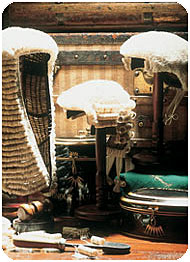Remarks by the Hon Justice Dowsett on the Occasion of the Announcement of the New Silks
We are pleased that Justice Kiefel has joined us on the Bench this morning.
On behalf of the Federal Court of Australia I congratulate each of you upon your appointment and wish you well in your future practice at the Inner Bar. In so doing I speak particularly on behalf of the Judges who are present in Court this morning, Justices Spender and Collier, who are absent from Brisbane, and the Chief Justice and members of the Court based in the other mainland capital cities and Darwin.
…
Whilst this is an occasion for celebration it is, by no means, a time for complacency. The legal profession and its institutions are no longer protected from public scrutiny, and the institutions under scrutiny certainly include that of Silk.
In 2005, Justice McHugh, speaking at the High Court dinner for the new Silks, said:
Being appointed silk means becoming part of a tradition dating back 400 years. Over the past decade, significant changes to this tradition have occurred. Various jurisdictions have replaced the title of Queen’s Counsel with Senior Counsel, discontinued the issuing of a Queen’s Commission and removed the powers of the Executive in the appointment process. The significance of the institution of silk, however, has not diminished, and the values it embodies remain just as important in the 21st century as at any time in its history.
The institution of silk formally dates back to 1604. Initially, King’s Counsel were bound by oath not to accept briefs against the Crown. By the 18th century the institution had evolved to a class of counsel simply given precedence and a rank superior to that of ordinary counsel.
 Today, the appointment of Senior Counsel provides a clear and public identification of those barristers whose skills, legal experience, and personal qualities mark them out as being the best within the legal profession. As the Chief Justice pointed out today, it is a recognition of professional eminence, with those achieving the rank being identified by their peers as leaders in the field of advocacy. For the public, it is a mark of excellence and of a continuing expectation that an individual will consistently perform to the highest standards. These expectations are not limited to the exercise of legal skills.
Today, the appointment of Senior Counsel provides a clear and public identification of those barristers whose skills, legal experience, and personal qualities mark them out as being the best within the legal profession. As the Chief Justice pointed out today, it is a recognition of professional eminence, with those achieving the rank being identified by their peers as leaders in the field of advocacy. For the public, it is a mark of excellence and of a continuing expectation that an individual will consistently perform to the highest standards. These expectations are not limited to the exercise of legal skills.
Furthermore an advocate, as an officer of the court, is central in assisting in the administration of justice according to law and in upholding the rule of law. As the Chief Justice also pointed out, there is a significant level of trust placed by judges in the advocates appearing before them, and it is vital to our justice system that judges are able, without question, to hold the utmost confidence in the integrity and character of each advocate appearing before the courts. As such, each advocate carries a significant burden. This burden is then magnified for those advocates achieving the rank of silk, who are expected to lead by example and to discharge these responsibilities to the fullest possible extent.
Being granted the status of silk is certainly a considerable personal achievement and cause for celebration. At the same time however it is more than just a personal accolade and reward. It brings with it responsibility for maintaining the distinguished tradition and expectation of both service and leadership that has been central to the institution for hundreds of years.
 Let me now read to you some extracts from a recent letter written by Mr Riordan of the Victorian Bar to the Chairman of the Victorian Bar Council and circulated by the writer to the Judges of this Court:
Let me now read to you some extracts from a recent letter written by Mr Riordan of the Victorian Bar to the Chairman of the Victorian Bar Council and circulated by the writer to the Judges of this Court:
Silk is awarded again by the Chief Justice on behalf of the Bar. It makes careers and destroys careers. It is critical. Successful candidates, as senior counsel, will bask in its rewards. They have the prestige. They will significantly increase their fees tomorrow. hey will generally only appear with another barrister, a junior. Solicitors will seek them out and brief them as “the best”. It is a happy time for them.
However, the system is deeply flawed. It is wholly archaic. It relies upon an irrelevant 16th century practice developed for entirely different reasons, by an irrelevant monarch. The operation of the system and the continuance of Silk is wholly inconsistent with contemporary standards. The continuance of the practice recognises the worst values amongst barristers. It is elitist. It is steeped in trappings and titles. Despite the hype, it is wholly unnecessary. If a barrister is excellent, the market will find and brief him or her accordingly. There is no need to decorate him or her with a rosette. No other profession feels the need to provide titles to mark the expertise of their members. We do not judge solicitors, accountants or surgeons by reference to a title. Their reputation is established by the quality of their work. Why do we keep the system? It is kept because it panders to egos. We dress up. We give titles. It is antediluvian.
The most significant indictment of the system is that it is wholly inconsistent with contemporary values. In particular, it is anti-competitive. Legal fees are significantly increased. Those fees are ultimately paid by the community. Without a silk system, and the inflated fees it entails, legal fees would be considerably reduced.
 One could not imagine two more different views about the same institution. No doubt both views reflect personal experience. The uncomfortable truth is that there is substance in each of them. All institutions contain the seeds of their own demise. They may be established to serve useful purposes but, with time, they decline, cease to serve such purposes and become bastions of vested interests rather than mechanisms for achieving their original or, frequently, any other, worthwhile purposes. I do not share Mr Riordan’s pessimism, but I believe that there is room for, and need for, more critical self-examination than Justice McHugh’s observations might suggest. You should be neither pessimistic nor complacent about the future of the institution of Silk. You should, however, keep in mind that it is an institution under scrutiny. Because it is, by definition, comprised of a small number of people, each of you will be subject to that scrutiny. It follows that your conduct will influence the future of the institution.
One could not imagine two more different views about the same institution. No doubt both views reflect personal experience. The uncomfortable truth is that there is substance in each of them. All institutions contain the seeds of their own demise. They may be established to serve useful purposes but, with time, they decline, cease to serve such purposes and become bastions of vested interests rather than mechanisms for achieving their original or, frequently, any other, worthwhile purposes. I do not share Mr Riordan’s pessimism, but I believe that there is room for, and need for, more critical self-examination than Justice McHugh’s observations might suggest. You should be neither pessimistic nor complacent about the future of the institution of Silk. You should, however, keep in mind that it is an institution under scrutiny. Because it is, by definition, comprised of a small number of people, each of you will be subject to that scrutiny. It follows that your conduct will influence the future of the institution.
You may treat Silk as a further endorsement on a barrister’s licence to print money.
You may devote your time exclusively to maximizing the extent to which you benefit personally from exercising that licence.
You may run cases for your own purposes without seeking to advise the clients as to where their interests really lie.
You may unduly extend cases by refusing to make practical decisions as to the necessary evidence or as to whether an argument is good or totally without prospects of success.
You may rely on the client, the solicitor or the junior to do the hard work, whilst taking credit for a good result and avoiding responsibility for a bad one.
If you take this approach you will follow a pattern which some have taken in the past, leading to much of the criticism which is now directed at the institution.
Alternatively, you might accept, with appropriate humility, that you are now a leader of an ancient profession, with the responsibilities which always accompany positions of leadership.
You might accept that henceforth you must spend a significant part of your time in serving the interests of the profession as a whole, through the Bar Association, in training new barristers and in continuing education.
You might accept that you will be retained for your wisdom, learning and judgment, making sure that you do the work necessary in order to apply those qualities to matters entrusted to you.
You might guide your clients, solicitors and juniors, using those same qualities, in order to apply available resources economically, so as to meet the client’s needs at minimum cost.
You might give thought to the wider needs of society by being economical in your use of court time, by facilitating the speedy resolution of all matters, by participating in projects designed to improve the administration of justice, by advising less-experienced colleagues and, from time to time, by performing appropriate pro bono work.
Many, perhaps most, of those who have previously achieved the dignity of Silk have recognized these wider responsibilities and the personal satisfaction to be derived from their faithful discharge. If you follow their examples, you will answer much of the criticism which is frequently directed at the institution of Silk, thereby helping to ensure its continued existence as a useful feature of the legal system.




 Today, the appointment of Senior Counsel provides a clear and public identification of those barristers whose skills, legal experience, and personal qualities mark them out as being the best within the legal profession. As the Chief Justice pointed out today, it is a recognition of professional eminence, with those achieving the rank being identified by their peers as leaders in the field of advocacy. For the public, it is a mark of excellence and of a continuing expectation that an individual will consistently perform to the highest standards. These expectations are not limited to the exercise of legal skills.
Today, the appointment of Senior Counsel provides a clear and public identification of those barristers whose skills, legal experience, and personal qualities mark them out as being the best within the legal profession. As the Chief Justice pointed out today, it is a recognition of professional eminence, with those achieving the rank being identified by their peers as leaders in the field of advocacy. For the public, it is a mark of excellence and of a continuing expectation that an individual will consistently perform to the highest standards. These expectations are not limited to the exercise of legal skills. Let me now read to you some extracts from a recent letter written by Mr Riordan of the Victorian Bar to the Chairman of the Victorian Bar Council and circulated by the writer to the Judges of this Court:
Let me now read to you some extracts from a recent letter written by Mr Riordan of the Victorian Bar to the Chairman of the Victorian Bar Council and circulated by the writer to the Judges of this Court: One could not imagine two more different views about the same institution. No doubt both views reflect personal experience. The uncomfortable truth is that there is substance in each of them. All institutions contain the seeds of their own demise. They may be established to serve useful purposes but, with time, they decline, cease to serve such purposes and become bastions of vested interests rather than mechanisms for achieving their original or, frequently, any other, worthwhile purposes. I do not share Mr Riordan’s pessimism, but I believe that there is room for, and need for, more critical self-examination than Justice McHugh’s observations might suggest. You should be neither pessimistic nor complacent about the future of the institution of Silk. You should, however, keep in mind that it is an institution under scrutiny. Because it is, by definition, comprised of a small number of people, each of you will be subject to that scrutiny. It follows that your conduct will influence the future of the institution.
One could not imagine two more different views about the same institution. No doubt both views reflect personal experience. The uncomfortable truth is that there is substance in each of them. All institutions contain the seeds of their own demise. They may be established to serve useful purposes but, with time, they decline, cease to serve such purposes and become bastions of vested interests rather than mechanisms for achieving their original or, frequently, any other, worthwhile purposes. I do not share Mr Riordan’s pessimism, but I believe that there is room for, and need for, more critical self-examination than Justice McHugh’s observations might suggest. You should be neither pessimistic nor complacent about the future of the institution of Silk. You should, however, keep in mind that it is an institution under scrutiny. Because it is, by definition, comprised of a small number of people, each of you will be subject to that scrutiny. It follows that your conduct will influence the future of the institution.